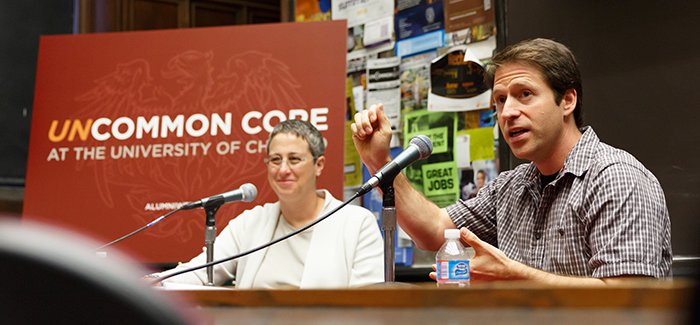
“I don’t believe that video games make people violent,” says Seropian, who popularized the “first-person shooter.” (Photography by Jason Smith)
Developer Alex Seropian, SB’91, redefined video games—and he sees profound changes to come.
Video games have transformed Alex Seropian’s life—he’s one of the country’s most innovative and successful developers—and he thinks that someday they might evolve to alter life itself. “It’s not far-fetched to think about a future where you’re jacking into a matrix and your perception of a virtual world is nigh but indistinguishable from your perception of the real world,” Seropian, SB’91, said in an UnCommon Core session with Chicago Booth entrepreneurship professor Waverly Deutsch during Alumni Weekend. “And when that happens, man, it’s going to get real weird.” Good weird, but still: weird.
Deutsch had asked Seropian about 3-D gaming and virtual reality headsets beginning to take off. “I look at games as a fundamental part of being a person,” he said. Games are ancient; they are as old as human civilization. “It’s clearly a part of how we express and relate to each other,” Seropian said. “But as you get tools and technology that bring game playing closer and closer to your physical body, it has very interesting implications.”
Seropian made his first video game as an undergraduate math major, working in his Woodward Court dorm room “with the dream that, hey, if I could actually finish this thing, I could sell it, and wouldn’t that be cool.” It was a Pong-like game called Gnop! He did finish it—and sold it (although mostly he gave it away for free). “I didn’t make any profit doing that, but it worked out well enough that I convinced myself to try again,” Seropian said. Ten years and a few games later, he and former classmate and fellow programmer Jason Jones, X’94, released Halo, a science fiction game depicting a vast interstellar war. Its influence on the industry has been compared to the effect of Star Wars on movies.
Since then, Seropian has seen—and helped generate—tremendous change in almost every facet of the video game business. Technology, artistry, and craftsmanship have traveled light-years. Business models have evolved too. “When I got started in the business, you’d make a game, you’d put it on a floppy disk, and you’d put it in a cardboard box, shrink-wrap it, and you’d have to beg somebody at, like, Walmart to actually sell it for you.” After that came consoles like PlayStation and Xbox, and huge corporate developers that made video games big business. Now crowd-source funding websites like Kickstarter and platforms like the Apple App Store have remade the industry again, opening up the process of creating games and getting them to customers. “If you’ve got 99 bucks, you can be a developer, publisher, and distributor of games to the largest gaming platform the world has ever seen,” he said. Customers “get a lot of noise, but you also get a lot of innovation that you would have never seen before.”
Customer demographics have changed too. When Seropian asked how many in the audience carried iPhones or Android phones, nearly everyone raised a hand. Their hands stayed up when he asked how many had ever played a game on these phones. Seropian’s most recent start-up company, Industrial Toys, founded in 2012, develops games for mobile platforms. “Today the average age of a gamer is 30-plus, and more women than men play games now,” he said. “That’s way different than it was ten years ago.”
Deutsch asked Seropian about the video game genre that Halo popularized: the first-person shooter, in which the player experiences the game through the eyes of the protagonist, looking at adversaries down the barrel of a gun. Deutsch told Seropian: “That young man”—she pointed to a student in the audience who’d applauded at the mention of Halo—“has spent many, many hours behind a gun, and there are people who say that that whole mechanism in video gaming is inuring kids to a whole new level of violence.”
Seropian nodded, but countered. “I don’t believe that video games make people violent,” he said. The father of three children, he doesn’t let his eight-year-old son play combat games, but will when his son is older. “I don’t see too much water in the bucket of that argument that video games are sending our society to a pit of despair,” Seropian said. The audience assented.
During the audience Q&A, Seropian fielded questions about video games’ reputed contributions to surgeon-level dexterity and staving off Alzheimer’s, and a mom’s request for more games with teammates rather than winners and losers. A student sitting at the back of the room asked what Seropian thought of the industry as a career choice right now. He had read that it was hard for game developers to make it on their own.
“Well,” Seropian said, a smile widening across his face, “I’m trying to think, what’s a better career choice?” He was only half joking. “I mean, if you’re into programming or you’re into art or you’re into playing games, it’s a frickin’ great career choice.”
